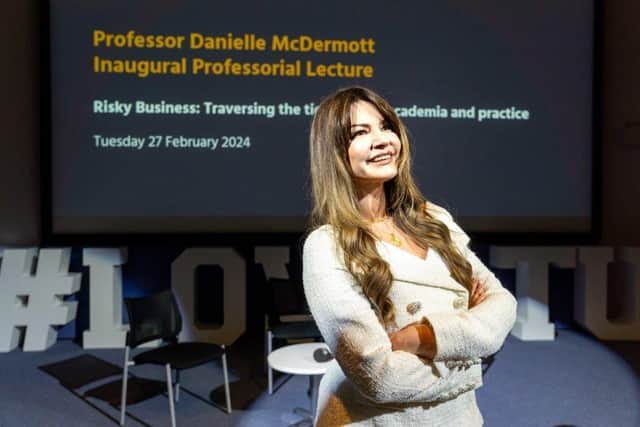Prisons can be places of hope, says Professor Danielle McDermott of Leeds Trinity University
To Professor Danielle McDermott, they can be places of hope and and, with the right support, offer a chance of new beginnings.
“There is every type of person in prison and it’s not all doom and gloom,’’ she said. “There’s lots of humour, fun and talent. As a society, we know people do bad things but that doesn't necessarily make them bad people who will never change.”
Advertisement
Hide AdAdvertisement
Hide AdBorn and raised in Leeds, Professor McDermott is the Head of Prisons and Custody at Leeds Trinity University, where she is responsible for leading and delivering a Masters in Applied Custodial Leadership, in partnership with Unlocked Graduates, a charity which aims to change the way we develop society’s leaders and how we think about prisons and prisoners, by focusing on rehabilitation and addressing the damage and cost of reoffending. Participants on the programme work full- time as prison officers in more than 25 prisons across the UK, while studying part-time.


Professor McDermott has a PhD in Forensic Psychology from the Institute for Psychological Sciences at the University of Leeds, for which she received a scholarship.
Her thesis explored the psychological risk factors associated with self-harming behaviours in young and adult male offenders and she remains passionately committed to using her academic insights to improve the lives of vulnerable people in prison.
"Having worked in prisons for almost 10 years, it quickly became apparent that self-harm was used in prison as a way of escaping and coping with difficult emotions,’’ she said.
Advertisement
Hide AdAdvertisement
Hide AdBefore working in academia, Professor McDermott spent more than 10 years working in prisons as a trainee forensic psychologist. She was initially appointed as the Treatment Manager for the Safer Custody Unit at HMP Leeds, a specialist unit for vulnerable prisoners at risk of self-harm and suicide.
"This experience taught me that it's important not to judge people,’’ she said. “People can have complex and nuanced lives; which might explain why they are where they are. People might be seen as dangerous, but they can also be extremely vulnerable.
"As part of my PHD, which examined the risk factors around self harm and suicide, I looked at emotional management which included impulsive behaviour and aggression. People who are violent towards others are sometimes violent to themselves. It's all a way of coping with difficult emotions.
"We need to teach people how to manage difficult emotions. Every emotional behaviour serves a function. It's important to understand what is the reason behind it.”
Advertisement
Hide AdAdvertisement
Hide AdShe later went on to work at His Majesties Young Offender Institution (HMYOI) Wetherby where she worked with young people who had been convicted of serious violent and sexual offences.
"I loved my work in Wetherby because it was full of hope,’’ she said. "I was working with people under the age of 18 who had a lot of talent and strengths but had been led astray or had lived very complex lives. I used to conduct risk assessments with young people who were convicted for violent and sexual offences and I had the ability to tailor interventions based on their needs. You don't see the positive outcomes when they leave prison but you know you've made a difference. It might be the first time somebody has told them they are good at something.”
She believes rehabilitation must be at the heart of the justice system and is proud to be an ambassador for Tempus Novo, an award-winning charity which helps to secure employment and provides mentoring to people released from prison.
"One of the best ways to stop re-offending is to get people into employment,’’ she added. "More employers should give people who have been in prison a chance, otherwise, what do we expect them to do when they leave? The vast majority of people in prison will be released at some point. There are great employers like John Lewis, Clipper Logistics and Timpsons who will work with former prisoners. We need to give them a second chance. My students are full time prison officers, who want to become future leaders in the criminal justice system. Prison officers don't seem to be regarded as heroes in the way that police officers are, but they are doing heroic things. We take about 120 student prison officers a year. My legacy will be what these students go out and achieve in the prison system.”
Advertisement
Hide AdAdvertisement
Hide AdNatasha Porter, the founder and CEO of Unlocked Graduates, said: “Danielle is very positively perceived in the justice sector. Her work is widely described as exceptional. She has also modelled collaboration and partnerships across the prison service and wider criminal justice sector, which has in turn raised the reputation of Leeds Trinity University.”
Earlier this week, Professor McDermott, delivered Leeds Trinity University’s first professorial lecture of 2024 at its campus in Horsforth, which outlined the long term value of her work. The lecture – “Risky Business: traversing the tightrope of academia and custodial practice” illustrated the challenge of striking a balance between research and practice.
She said: “I have worked with some of the most vulnerable and risky people in society, regularly confronted with unfathomable situations. The common thread running through my professional life is the importance of building relationships and it’s something I pride myself on. I feel honoured to be able to share my career and experience with my amazing family, friends and colleagues old and new.”
Comment Guidelines
National World encourages reader discussion on our stories. User feedback, insights and back-and-forth exchanges add a rich layer of context to reporting. Please review our Community Guidelines before commenting.